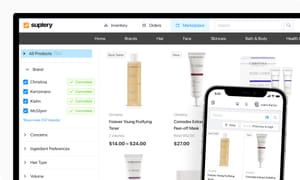From words to action
Start working with Suplery and explore all the tools and services you need to expand your business
Get started24/7 Support
Secure payments
Designed by industry’s experts

Are you passionate about art and interested in a career that allows you to express your creativity while helping others express theirs? Becoming a tattoo artist might be the perfect path for you! Tattooing is a rapidly growing industry with a high demand for skilled artists. But how do you get started in this exciting and rewarding field? In this ultimate step-by-step guide, we'll walk you through everything you need to know how to become a tattoo artist, from finding an apprenticeship to building your portfolio and developing your unique style. Get ready to turn your passion into a career that you'll love!
Becoming a tattoo artist is no easy feat, but it is certainly achievable with dedication and hard work. The road to becoming a tattoo artist typically involves completing an apprenticeship, which can take anywhere from one to three years. During this time, you will learn the fundamentals of tattooing, including techniques for using different types of equipment and creating designs that meet clients' needs. You will also need to develop a strong understanding of hygiene and safety practices to prevent the spread of infection. In the end, to be a successful tattoo artist, you need more than just technical skills. You also need to have a strong work ethic, be creative, and be willing to learn and get better all the time. With perseverance and passion, however, anyone can achieve their dream of becoming a tattoo artist.
A tattoo artist is a skilled professional who creates permanent artwork on clients' skin using a tattoo machine and ink. Their job involves various tasks, including:
Overall, tattoo artist is responsible for providing a safe and comfortable environment for their clients while creating high-quality and unique pieces of art.
Qualifications to be a tattoo artist is a unique and rewarding career path, but it requires a specific set of skills and personal qualities. Here are the basic requirements to be a tattoo artist.
Overall, you need a mix of technical skills, creativity, and personal traits to become a tattoo artist. Those who are passionate about art, have a steady hand, and are willing to undergo the necessary training and apprenticeships can find success in this exciting and rewarding career.
Becoming a tattoo artist may seem like a daunting task, but with the right steps and dedication, it can be accomplished. Here are the steps to become a tattoo artist:
Taking a tattoo artist course can provide a strong foundation in the art of tattooing. Many courses cover topics such as design, technique, equipment, and hygiene.
Building a portfolio is an essential part of becoming a successful tattoo artist. A portfolio showcases your work and demonstrates your style and technique.
Apprenticeships provide hands-on training under the guidance of an experienced tattoo artist. Apprenticeships typically last one to three years and consist of learning the fundamentals of tattooing, such as equipment use, design, hygiene, and safety.
Many states require tattoo artists to obtain a license before practicing professionally. Licensing requirements vary by state but often involve completing a certain number of training hours, passing a written exam, and providing proof of insurance.
As a tattoo artist, you'll need to invest in your own equipment, including a tattoo machine, needles, ink, and other supplies. It's important to choose high-quality equipment to ensure the safety and satisfaction of your clients.
Suplery is a platform that allows tattoo artists to order products easily and manage inventory online. It can help streamline the process of ordering and tracking supplies, freeing up time for artists to focus on their craft.
Save time and avoid out-of-stock issues with Suplery's intuitive inventory alerts and easy automatic ordering tool
Sign up for free
How do you become a tattoo artist? Becoming a skilled tattoo artist takes practice. So it's important to continue practicing and honing your skills to improve your technique and develop your own unique style. For example, you could becoming a tattoo apprentice.
Tattooing is an art form that allows for creativity and experimentation. Experimenting with various designs and styles can help you find your niche and stand out from other tattoo artists.
Marketing and advertising your services is the key to building a successful tattoo business. The creation of a website, a social media presence, and business cards can help spread the word about your services.
Building a loyal client base is essential to a successful tattoo career. By giving great customer service, listening to what clients want, and doing high-quality work, you can build a strong reputation and get clients to return.
Tattooing trends and styles are constantly evolving, and it's important to stay up-to-date with current trends and techniques. Attending tattoo conventions, following industry leaders on social media, and continuing education can help keep your skills and style relevant.
Becoming a tattoo artist can be a rewarding career choice for those with a passion for art and a desire to express themselves creatively. However, like any profession, there are both pros and cons to consider before embarking on this career path.
Pros:
Cons:
If you are interested in a question - how to get into tattooing? Hard work, dedication and love for your craft will help you. Although there are certainly issues that need to be considered, the reward can be great for those who are passionate about tattooing and want to build a successful career in this field.
Can you become a tattoo artist without knowing how to draw?
It's difficult to become a successful tattoo artist without strong drawing skills. However, some artists develop their skills over time through practice and training.
How can I train to be a tattoo artist?
Training to become a tattoo artist typically involves taking a course or an apprenticeship, building a portfolio, and obtaining a license.
Is it hard to become a tattoo artist?
Yes, becoming a tattoo artist requires a significant amount of time, effort, and dedication. It takes years of practice and honing your skills to be successful in this field. However, for those who have a passion for the art form and are willing to put in the hard work, becoming a skilled tattoo artist can be a truly rewarding and fulfilling career path.
What do you need to become a tattoo artist?
To pursue a career as a tattoo artist, you should possess a genuine interest in art, excellent drawing abilities, attention to detail, creative thinking, and interpersonal skills. These traits can help you excel in the field and establish a successful career as a tattoo artist. In addition to these personal traits, some states in the US may require formal training or an apprenticeship under a licensed tattoo artist to obtain a tattooing license.
How much does a tattoo artist make?
The income of a tattoo artist varies based on experience, location, and clientele. According to Payscale, the average hourly rate for a tattoo artist in the US is $48.71.
How to be a tattoo artist?
To become a tattoo artist, start with mastering drawing skills, then complete a tattoo apprenticeship. Learn equipment handling, safety protocols, and client service. Obtain required licenses, build a portfolio, and continuously improve through practice and ongoing education in the field.
How to become a professional tattoo artist?
To become a professional tattoo artist, develop strong art skills, complete an apprenticeship, and learn safety and hygiene practices. Obtain necessary licenses, create a compelling portfolio, and gain experience by working in established studios or starting your own business. Continuous learning is essential.
Subscribe now for actionable how-to guides, foolproof business strategies, and practical advice. Transform your "how-to" questions into successful business actions today!
Ooops! Something went wrong, please try again
Done! You are subscribed to the Suplery newsletter ✓
Unsubscribe anytime. Your data is stored for business-to-business communication purposes. See our privacy policy.
Last updated on May 03, 2023
“What Changed” in this article? Everything. It's packed with the latest findings, the ripest data, and a fresh analysis you won't find anywhere else.
Start working with Suplery and explore all the tools and services you need to expand your business
Get started24/7 Support
Secure payments
Designed by industry’s experts